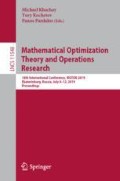Abstract
We present a framework for optimizing sparse quadratic assignment problems. We propose an iterative algorithm that dynamically generates the quadratic part of the assignment problem and, thus, solves a sparsified linearization of the original problem in every iteration. This procedure results in a hierarchy of lower bounds and, in addition, provides heuristic primal solutions in every iteration. This framework was motivated by the task of the French government to design the French keyboard standard, which included solving sparse quadratic assignment problems with over 100 special characters; a size where many commonly used approaches fail. The design of a new standard often involves conflicting opinions of multiple stakeholders in a committee. Hence, there is no agreement on a single well-defined objective function that can be used for an extensive one-shot optimization. Instead, the process is highly interactive and demands rapid prototyping, e.g., quick primal solutions, on-the-fly evaluation of manual changes, and prompt assessments of solution quality. Particularly concerning the latter aspect, our algorithm is able to provide high-quality lower bounds for these problems in several minutes.
Access this chapter
Tax calculation will be finalised at checkout
Purchases are for personal use only
Notes
- 1.
https://normalisation.afnor.org/actualites/faq-clavier-francais/ – retr. 2019-04-03.
- 2.
We give no polynomial time guarantee. The existence of a PTAS would imply P = NP.
References
Adams, W., Johnson, T.: Improved linear programming-based lower bounds for the quadratic assignment problem. DIMACS 512 Ser. Discret. Math. Theor. Comput. Sci. 16, 43–77 (1994). https://doi.org/10.1090/dimacs/016/02
AFNOR: Interfaces utilisateurs - Dispositions de clavier bureautique français, NF Z71–300 Avril 2019
Arkin, E.M., Hassin, R., Sviridenko, M.: Approximating the maximum quadratic assignment problem. Inf. Process. Lett. 77(1), 13–16 (2001). https://doi.org/10.1016/S0020-0190(00)00151-4
Birkhoff, D.: Tres observaciones sobre el algebra lineal. Universidad Nacional de Tucuman Revista Serie A 5, 147–151 (1946)
Burkard, R.E., Çela, E., Pardalos, P.M., Pitsoulis, L.S.: The Quadratic Assignment Problem, pp. 1713–1809. Springer, Boston (1998). https://doi.org/10.1007/978-1-4613-0303-9_27
Burkard, R., Offermann, J.: Entwurf von Schreibmaschinentastaturen mittels quadratischer Zuordnungsprobleme. Zeitschrift für Oper. Res. 21, 121–132 (1977)
DGLFLF: Rapport au Parlement sur l’emploi de la langue française. Government Report (2015). http://www.culture.gouv.fr/Thematiques/Langue-francaise-et-langues-de-France/La-DGLFLF/Nos-priorites/Rapport-au-Parlement-sur-l-emploi-de-la-langue-francaise-2015. From the Délégation générale à la langue française et aux langues de France of the Ministère de la Culture et de la Communication (in French)
DGLFLF: Vers une norme française pour les claviers informatiques. Government Publication (2016). http://www.culture.gouv.fr/Thematiques/Langue-francaise-et-langues-de-France/Politiques-de-la-langue/Langues-et-numerique/Les-technologies-de-la-langue-et-la-normalisation/Vers-une-norme-francaise-pour-les-claviers-informatiques. From the Délégation générale à la langue française et aux langues de France of the Ministère de la Culture et de la Communication (in French)
Feit, A.M.: Assignment Problems for Optimizing Text Input. G5 artikkeliväitöskirja (2018). http://urn.fi/URN:ISBN:978-952-60-8016-1
Frieze, A., Yadegar, J.: On the quadratic assignment problem. Discrete Appl. Math. 5(1), 89–98 (1983). https://doi.org/10.1016/0166-218X(83)90018-5
Gilmore, P.C.: Optimal and suboptimal algorithms for the quadratic assignment problem. SIAM J. Appl. Math. 10, 305–313 (1962)
Gurobi Optimization, L.: Gurobi Optimizer Version 8.1 (2019). http://www.gurobi.com
Huber, C., Riedl, W.: The Quadratic Assignment Problem: the Linearization of Xia and Yuan is Weaker than the Linearization of Adams and Johnson and a Family of Cuts to Narrow the Gap, preprint on webpage at https://arxiv.org/abs/1710.02472
John, M., Karrenbauer, A.: A Novel SDP Relaxation for the Quadratic Assignment Problem Using Cut Pseudo Bases, pp. 414–425. Springer, Cham (2016). https://doi.org/10.1007/978-3-319-45587-7_36
Kaufman, L., Broeckx, F.: An algorithm for the quadratic assignment problem using Benders’ decomposition. Eur. J. Oper. Res. 2(3), 207–211 (1978). https://doi.org/10.1016/0377-2217(78)90095-4
Koopmans, T., Beckmann, M.J.: Assignment Problems and the Location of Economic Activities. Cowles Foundation Discussion Papers 4, Cowles Foundation for Research in Economics, Yale University (1955). http://EconPapers.repec.org/RePEc:cwl:cwldpp:4
Lawler, E.L.: The quadratic assignment problem. Manag. Sci. 9(4), 586–599 (1963). https://doi.org/10.1287/mnsc.9.4.586
Lee, Y., Orlin, J.B.: On Very Large Scale Assignment Problems, pp. 206–244. Springer, Boston (1994). https://doi.org/10.1007/978-1-4613-3632-7_12
Nugent, C., Vollman, T., Ruml, J.: An experimental comparison of techniques for the assignment of facilities to locations. Oper. Res. 16(1), 150–173 (1968). https://doi.org/10.1287/opre.16.1.150
Peng, J., Mittelmann, H., Li, X.: A new relaxation framework for quadratic assignment problems based on matrix splitting. Math. Program. Comput. 2(1), 59–77 (2010). https://doi.org/10.1007/s12532-010-0012-6
Pollatschek, M., Gershoni, N., Radday, Y.: Optimization of the typewriter keyboard by simulation. Angewandte Mathematik 10 (1976)
Povh, J., Rendl, F.: Copositive and Semidefinite relaxations of the quadratic assignment problem. Discret. Optim. 6(3), 231–241 (2009). https://doi.org/10.1016/j.disopt.2009.01.002
Queyranne, M.: Performance ratio of polynomial heuristics for triangle inequality quadratic assignment problems. Oper. Res. Lett. 4(5), 231–234 (1986). https://doi.org/10.1016/0167-6377(86)90007-6
Sherali, H.D., Adams, W.P.: A hierarchy of relaxations and convex hull characterizations for mixed-integer zero-one programming problems. Discret. Appl. Math. 52(1), 83–106 (1994). https://doi.org/10.1016/0166-218X(92)00190-W
Xia, Y., Yuan, Y.X.: A new linearization method for quadratic assignment problems. Optim. Methods Softw. 21(5), 805–818 (2006). https://doi.org/10.1080/10556780500273077
Zhang, H., Beltran-Royo, C., Ma, L.: Solving the quadratic assignment problem by means of general purpose mixed integer linear programming solvers. Ann. OR 207, 261–278 (2013)
Zhao, Q., Karisch, S.E., Rendl, F., Wolkowicz, H.: Semidefinite programming relaxations for the quadratic assignment problem. J. Comb. Optim. 2(1), 71–109 (1998). https://doi.org/10.1023/A:1009795911987
Author information
Authors and Affiliations
Corresponding author
Editor information
Editors and Affiliations
Rights and permissions
Copyright information
© 2019 Springer Nature Switzerland AG
About this paper
Cite this paper
John, M., Karrenbauer, A. (2019). Dynamic Sparsification for Quadratic Assignment Problems. In: Khachay, M., Kochetov, Y., Pardalos, P. (eds) Mathematical Optimization Theory and Operations Research. MOTOR 2019. Lecture Notes in Computer Science(), vol 11548. Springer, Cham. https://doi.org/10.1007/978-3-030-22629-9_17
Download citation
DOI: https://doi.org/10.1007/978-3-030-22629-9_17
Published:
Publisher Name: Springer, Cham
Print ISBN: 978-3-030-22628-2
Online ISBN: 978-3-030-22629-9
eBook Packages: Computer ScienceComputer Science (R0)

